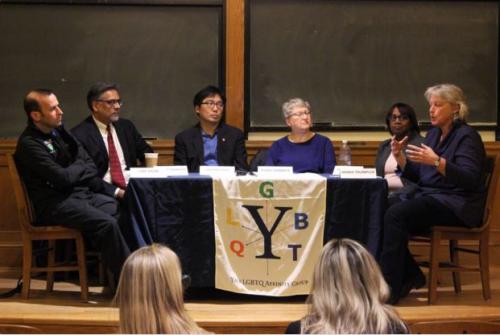
Administrators addressed the issue of diversity and inclusion for the University’s employees, particularly staff members, at a Monday town hall meeting hosted by the Yale LGBTQ Affinity Group.
Roughly 50 attendees, mostly staff members, met with administrators to discuss diversity in the broader Yale community and speak about how student activism last fall surrounding racial justice may translate to the workplace. Attendees and panelists addressed staff members’ lack of visibility and voice in such discussions on campus, and brainstormed ways to bring together different diversity resources and initiatives that are currently spread across campus. They also noted that staff members — who work in areas such as human resources or bookkeeping and do not have the same job security as faculty members — may not feel comfortable speaking out about problems with diversity outside of events like Monday’s. Women make up more than 60 percent of the University’s staff, and historically underrepresented minorities make up nearly 30 percent.
“Students have permission to push buttons, but staff members don’t have the same role,” Elysa Bryant, an assistant administrator of human resources at the Law School, told the News. “It is not a safe thing for a staff member to do. We have to find a way to ensure that staff members can talk about these issues while being safe.”
Panelists included Deputy Provost for Faculty Development and Diversity Richard Bribiescas, Director of the Office of LGBTQ Resources Maria Trumpler GRD ’92, Berkeley College Master Marvin Chun, Deputy Title IX Coordinator and Associate Dean of the Yale School of Drama Joan Channick, Director of the Office for Equal Opportunity Programs Valarie Stanley and pediatrics professor Carl Baum, who serves on a provostial advisory committee on disability resources.
Bribiescas told the News that the conversation reinforced his conviction that diversity is a community issue.
“Staff members face unique challenges, but a lot of it is related to the overall climate and accountability in terms of how important diversity is to the community,” he said.
While student protests and teach-ins in the fall have brought undergraduate and faculty diversity to the fore of campus discussion, diversity among the University’s staff has garnered relatively less attention. Panelists and attendees both suggested that this is due to structural issues, such as students and faculty receiving more representation on committees and decision-making groups than staff. Trumpler said some other institutions boast a more balanced representation among the different constituencies and suggested that staff members be included more in these leadership committees and discussions.
The idea of “giving voice” to staff members was repeated several times throughout the conversation. Multiple attendees asked how staff members could participate in open discussions about race and diversity, given the ways in which their roles on campus differ from faculty and students, as well as their decreased job security compared to tenured professors.
Bryant added that there should be a way to bring up and resolve such issues in an open and civil dialogue that does not become confrontational, suggesting that such a mode of discussion would be particularly helpful for staff members worried about their jobs.
She also noted that such town hall events about diversity on campus may be speaking to a self-selecting audience — an idea many others voiced during the event as well. During the question-and-answer session that followed the panel, one attendee said that while community meetings are informative and helpful, many people who attend are already interested in equity and inclusion. Those who need to learn about these issues, on the other hand, rarely attend, the attendee said.
“How do we create an environment where we can talk about these issues openly?” the attendee said. Panelists suggested that education and diversity and sensitivity training would help make the community more open to discussions.
When prompted about how Yale can improve on diversity and inclusion, Trumpler also called for more diversity among the University’s top administrators, and attendees suggested that there is a top-down effect in reinforcing the importance of diversity.
Administrators also acknowledged other structural challenges to creating transparent and open discussions on campus: Chun cited the size of the University as one example, and Bribiescas noted the proliferation of disparate diversity initiatives across campus as another. In fact, the panelists admitted that while they individually promoted diversity within their constituencies — undergraduates, faculty and staff — they had never met as a group before Monday’s panel. Diversity, Bribiescas repeated, is a community issue and therefore must be addressed by the entire community in a collaborative manner.
Attendees said the town hall was informative and helped contextualize the conversations about diversity among staff members, in light of recent student activism.
Ben McManus ’78, a senior administrative assistant at the School of Engineering & Applied Science, said recent student protests have brought issues that were formerly buried back to light. Yale has had the same diversity issues since he was an undergraduate, McManus said, and discussions such as Monday’s town hall are a good outgrowth of student activism.
McManus said that as an alumnus and a resident of New Haven, he still sees the complicated relationship Yale has with local residents and promoting diversity in general through hiring. Still, he added that the event has made him aware of the progress Yale is making.
“I’ve been aware of the affinity groups and the various diversity initiatives. But it’s good to hear from the people doing it and to put faces to names,” he said.